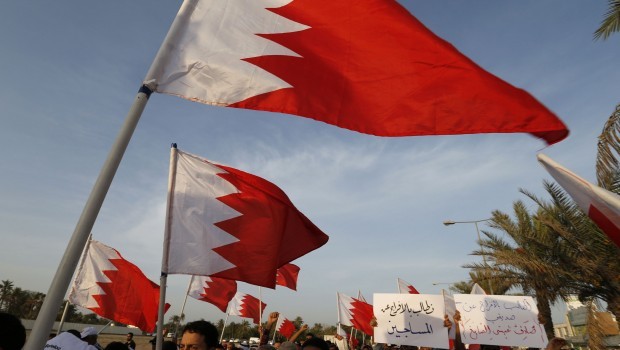
Protesters holding Bahraini flags and anti-government banners march during a rally organized by Bahrain’s main opposition group, Al-Wefaq, in Budaiya, west of Manama, on July 5, 2013. (REUTERS/Hamad I Mohammed)
London/ Manama, Asharq Al-Awsat—In a session held Wesneday, the working group of Bahrain’s National Consensus Dialogue reached a consensus on a number of principles and fundamentals values, Asharq Al-Awsat has learned.
Bahrain’s education minister, Majid Ali bin Al-Nuaimi, told Asharq Al-Awsat by telephone that the session was “positive and fruitful. . . . Therefore, it managed to emerge with a mutual vision and a unified formula for the consensual principles, values and fundamentals that will serve as a basis for the dialogue, pushing it towards achieving national consensus among the different participants, including representatives of the government, the political societies and independent [figures] from the legislative authority.”
Nuaimi said that Wednesday’s session explored the agreed principles and fundamentals and discussed a proposal submitted by the country’s five political societies on the same topic.
Among the principles and values discussed were good governance, judicial independence, easing access to the judiciary, while holding free and fair elections according to international best practice, affirming political pluralism, and the rejection of quotas based on sect, gender, race, language, religion or faith.
Nuaimi said: “It became clear in this session that the activity of the working group was positive and fruitful,” adding that a “a unified proposal has been drafted and will be proposed in the forthcoming public session, a thing that will undoubtedly help [the dialogue] follow the agenda and quicken its pace towards achieving national consensuses and positive results that will end the state of polarization and defuse tension.”
The education minister told Asharq Al-Awsat that he was optimistic about the future of dialogue sessions, saying: “Dialogue is an inevitability and necessity among brothers, even if they disagree. . . . I believe that the dialogue sessions held over the past months were beneficial and necessary to progress towards national consensus.”
“I think everybody is aware and convinced of this matter and wants truly to arrive at a consensual solution,” he said, adding, “We as Bahrainis have no choice but to reach consensus. It is our fate and future.”
The working group is comprised of the Minister of Justice Shaikh, Khalid bin Ali Al Khalifa, and the Minister of Education, Majid bin Ali Al-Nuaimi, who represent the government; Abdulaziz Abul and Sawsan Hajji Taqawi representing the legislative authority; Khalid Mohammed Al-Qattan and Ahmed Sanad Al-Binali representing the Coalition of National Political Societies; and Hafidh Ali and Majeed Milad Ahmed from the national democratic opposition societies.
Abeed Al-Suhaimy contributed reporting.
